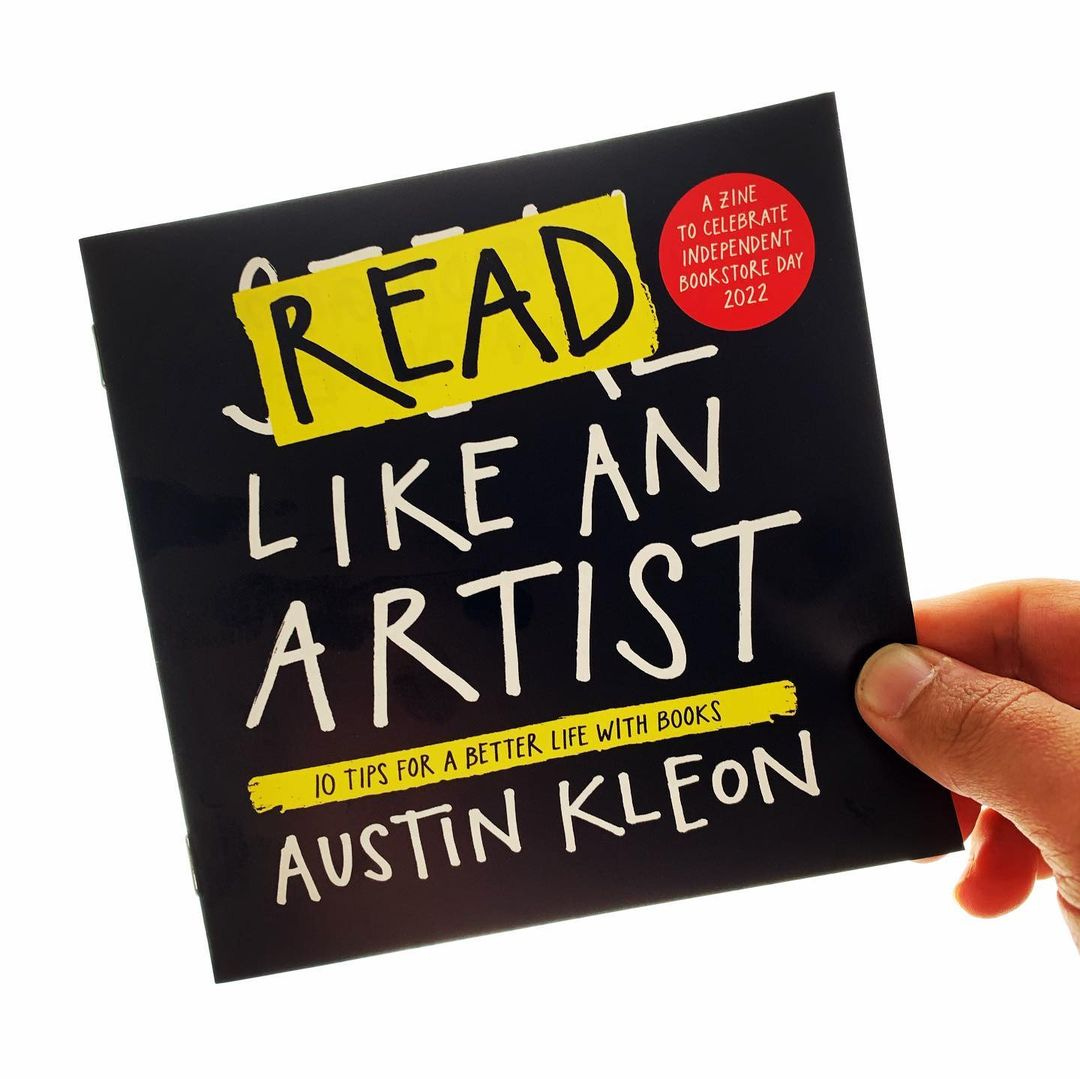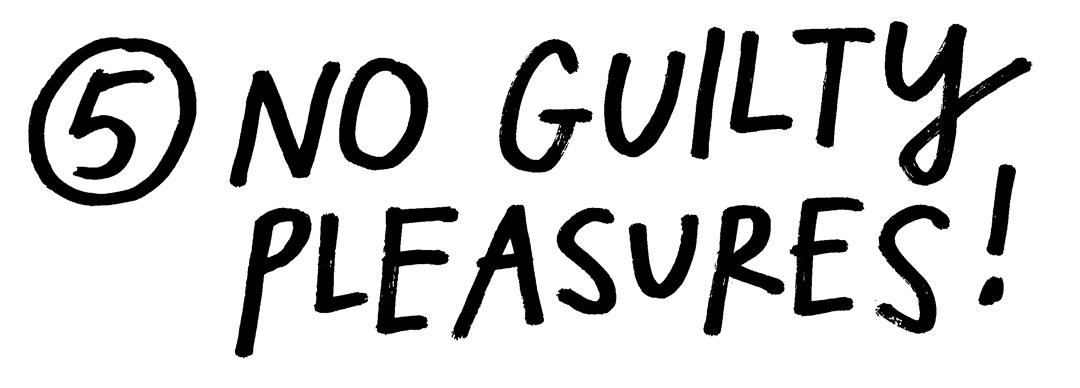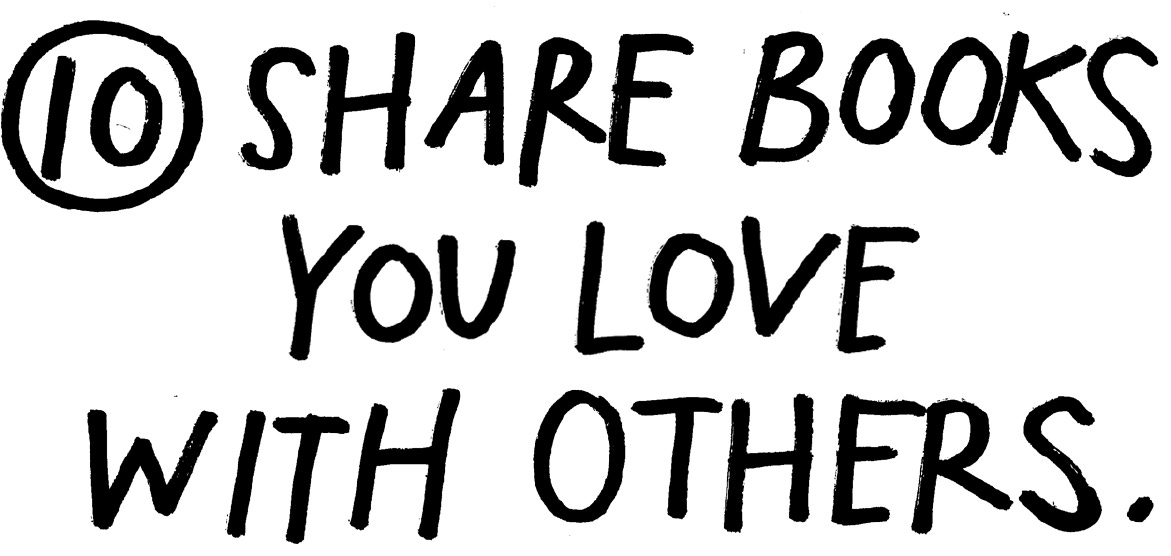How to read like an artist
How to read like an artist
10 tips for a better life with books
Hey y’all,
On Saturday, bookstores around the country gave away this free zine we made to celebrate Independent Bookstore Day. I had so many requests from people who couldn’t get a copy that I’m sharing the complete text below.
These tips are what have helped me enrich my reading life over the years. If you’ve been reading me for a while, many of them will sound familiar!
“If a book is tedious to you, don’t read it; that book was not written for you.”
—Jorge Luis Borges
If you aren’t getting anything out of a book, put it down and pick up another book. Every hour you spend inching through a boring book is an hour you could’ve spent plowing through a brilliant one.
When it comes to books, quitters finish more.
It helps if you choose the right books in the first place. Stop reading what you think you should be reading and just read what you genuinely want to read. Read what you love.
Get used to carrying a book around with you wherever you go and reaching for it in all the spare moments you’d usually pull out your phone. (Commutes, lunch breaks, grocery store lines, etc.)
Go to bed early and bring your book with you. If you fall asleep while reading, pick it back up when you wake and read for a bit before you get out of bed.
Always have a book queued up for when you finish the current book you’re reading. Keep piles of unread books stacked around the house. (The Japanese call this “tsundoku.”)
A pile of books is nothing to be ashamed of. It says, “No matter what, at least we have more books to read.”
A big part of reading is visiting other worlds, and you can’t visit another world if you’re constantly distracted by this one.
If you’re going to read on your phone or e-reader, switch it to airplane mode so you’re not even tempted to go online.
When you sit down to read a paper book, either put your phone in airplane mode, or plug your phone in across the room so you’re not tempted to reach for it.
Consider getting a paper dictionary, so when you read at home or in the office, you don’t have to pull out your phone to look up words.
“The intellectual is, quite simply, a human being who has a pencil in his or her hand when reading a book.”
—George Steiner
You don’t really own a book until you’ve written in it. A fancy word for this is marginalia. Underline sentences you love. Scribble notes to yourself in the margins. Doodle. Argue with the author. Make reading a conversation.
But do not, under any circumstances, write in library books. A special place in Hell is reserved for such transgressions.
“I don’t believe in guilty pleasures... If you like something, like it.”
—Dave Grohl
We all love things that other people think are garbage. You have to have the courage to keep loving your garbage.
What makes us unique is the diversity and breadth of our influences, the unique ways in which we mix up the parts of the culture others have deemed “high” and “low.”
When you find something you genuinely enjoy, don’t let anyone make you feel bad about it. Love what you love.
Read old books. Human beings have been around for a long time, and almost every problem you have has probably been written about by some other human living hundreds, if not thousands, of years before you.
Seneca said if you read old books, you get to add all the years the author lived to your own life.
You don’t have to go that far into the past to discover things that we’ve already forgotten about. Cracking a book that’s only a quarter of a century old can be like opening a chest of buried treasure.
Visit your own past, too. Re-read your favorites. A book is “shelf-stable,” but you are constantly changing, so every time you pick up an old book, it becomes a new book.
Date a lot of books until you find one you want to settle down with. Read more than one book and more than one kind of book at a time. Let the authors talk to each other.
“I generally have four or five books open around the house . . . and they are not books on the same subject. They don’t relate to each other in any particular way, and the ideas they present bounce off one another. . . . I come up with ideas that I might not have come up with if I had simply stuck to one book until I was done with it and then gone and picked up another.”
—Octavia E. Butler

Make regular trips to your local library and independent bookstore! It’s great to discover books through online friends and aquaintances, but there’s nothing quite like the “serendipity of the stacks”—the magical discoveries you make in a room full of books.
Distraction is terrible when reading books, but it’s great for discovering new books. You never know what you’ll bump into in the stacks. You go hunting for one book and you find an even better one shelved a few books down from it. It’s good to find the books you’re looking for, but delightful to find the books you didn’t know you were looking for.
Connecting with a book is so much about being the right reader in the right place at the right time. You have to feel free to skip books, quit books, or maybe even come back to them later.
A book that isn’t for you may be the perfect book for somebody else. Unless you’re a book critic, you’re not obligated to pass judgment. Just say, “It wasn’t for me.”
The beautiful thing is: “Me” is always changing. You’re a different you today than you were yesterday. That book that wasn’t for you today might be just the right book for you tomorrow.
Keep track of what you read in a notebook or online. Share what you read with others. Make lists of your favorite books. Write reviews. Start a book club. Give books as gifts.
When you share your favorite books, you meet the people who love those kinds of books, too. They’ll give you even more to read. When you don’t know what to say to a stranger, ask them what they’re reading. Take notes.





































